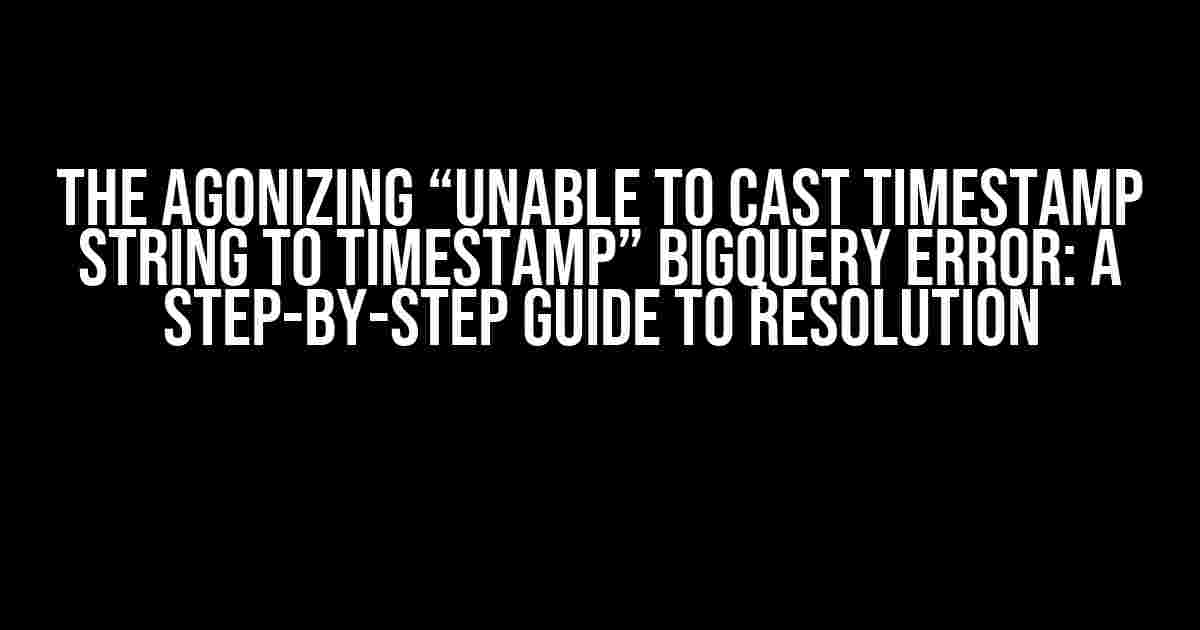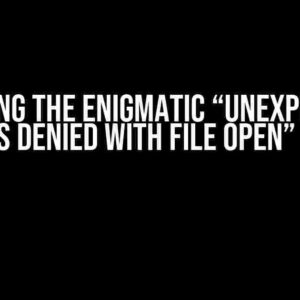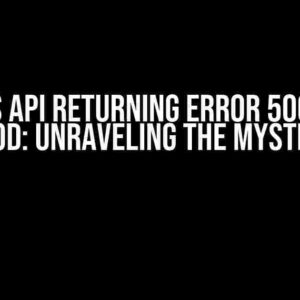Are you tired of running into the frustrating “Unable to cast timestamp string to timestamp” error in BigQuery? You’re not alone! This pesky error can bring your data analysis to a grinding halt, leaving you scratching your head and wondering what went wrong. Fear not, dear reader, for we’ve got you covered. In this comprehensive guide, we’ll delve into the causes of this error, and more importantly, provide you with the solutions to overcome it.
What Causes the “Unable to Cast Timestamp String to Timestamp” Error?
Before we dive into the solutions, it’s essential to understand the root causes of this error. The “Unable to cast timestamp string to timestamp” error typically occurs when you’re trying to insert a timestamp string into a timestamp column in BigQuery, but the format is not compatible. This can happen due to several reasons:
- Inconsistent timestamp format: If your timestamp string is not in the correct format, BigQuery won’t be able to cast it to a timestamp. The default timestamp format in BigQuery is ‘YYYY-MM-DD HH:MM:SS.UUUUUU’, but if your string is in a different format, you’ll run into issues.
- Invalid timestamp characters: If your timestamp string contains invalid characters, such as hyphens or slashes, it won’t be recognized by BigQuery.
- Timestamp string length: If your timestamp string is too long or too short, it may not be compatible with BigQuery’s timestamp format.
- Data type mismatch: If the data type of your timestamp column is not set to TIMESTAMP, you’ll encounter this error.
Resolution Strategies for the “Unable to Cast Timestamp String to Timestamp” Error
Now that we’ve covered the potential causes, let’s move on to the solutions. Here are some step-by-step strategies to help you overcome this error:
Method 1: Verify and Correct the Timestamp Format
The first step is to ensure your timestamp string is in the correct format. You can use the PARSE_TIMESTAMP function to cast your timestamp string to a timestamp. Here’s an example:
SELECT
PARSE_TIMESTAMP('%Y-%m-%d %H:%M:%S', '2022-01-01 12:00:00') AS timestamp
In this example, the PARSE_TIMESTAMP function takes two arguments: the format string ‘%Y-%m-%d %H:%M:%S’ and the timestamp string ‘2022-01-01 12:00:00’. This will return a valid timestamp that BigQuery can recognize.
Method 2: Use the Safe_cast Function
Another approach is to use the SAFE_CAST function to cast your timestamp string to a timestamp. This function will return NULL if the casting fails, rather than throwing an error. Here’s an example:
SELECT
SAFE_CAST('2022-01-01 12:00:00' AS TIMESTAMP) AS timestamp
In this example, the SAFE_CAST function will attempt to cast the timestamp string ‘2022-01-01 12:00:00’ to a timestamp. If the casting fails, it will return NULL.
Method 3: Convert the Timestamp Column to a String
If you’re having trouble casting your timestamp string to a timestamp, you can try converting the timestamp column to a string instead. This can be done using the FORMAT_TIMESTAMP function. Here’s an example:
SELECT
FORMAT_TIMESTAMP('%Y-%m-%d %H:%M:%S', timestamp) AS formatted_timestamp
FROM
your_table
In this example, the FORMAT_TIMESTAMP function takes two arguments: the format string ‘%Y-%m-%d %H:%M:%S’ and the timestamp column ‘timestamp’. This will return a string representation of the timestamp that you can use for further processing.
Method 4: Use a Regular Expression to Extract the Timestamp
If your timestamp string is embedded within a larger string, you can use a regular expression to extract the timestamp. Here’s an example:
SELECT
REGEXP_EXTRACT('2022-01-01 12:00:00 some extra text', r'(\d{4}-\d{2}-\d{2} \d{2}:\d{2}:\d{2})') AS timestamp
In this example, the REGEXP_EXTRACT function uses a regular expression to extract the timestamp from the string ‘2022-01-01 12:00:00 some extra text’. The regular expression pattern ‘(\d{4}-\d{2}-\d{2} \d{2}:\d{2}:\d{2})’ matches the timestamp format ‘YYYY-MM-DD HH:MM:SS’.
Best Practices to Avoid the “Unable to Cast Timestamp String to Timestamp” Error
To avoid running into the “Unable to cast timestamp string to timestamp” error in the future, follow these best practices:
- Standardize your timestamp format: Use a consistent timestamp format throughout your data to avoid compatibility issues.
- Validate your timestamp strings: Before inserting timestamp strings into BigQuery, validate them to ensure they conform to the correct format.
- Use the PARSE_TIMESTAMP function: When casting timestamp strings to timestamps, use the
PARSE_TIMESTAMPfunction to ensure correct formatting. - Test your queries: Thoroughly test your queries to catch any errors before running them on large datasets.
Conclusion
The “Unable to cast timestamp string to timestamp” error in BigQuery can be frustrating, but with the right strategies and best practices, you can overcome it. By understanding the causes of this error and applying the solutions outlined in this guide, you’ll be well on your way to successfully inserting timestamp strings into BigQuery. Remember to standardize your timestamp format, validate your timestamp strings, and use the PARSE_TIMESTAMP function to cast your timestamp strings to timestamps. Happy querying!
| Method | Description |
|---|---|
| Method 1: Verify and Correct the Timestamp Format | Use the PARSE_TIMESTAMP function to cast your timestamp string to a timestamp. |
| Method 2: Use the Safe_cast Function | Use the SAFE_CAST function to cast your timestamp string to a timestamp, returning NULL if the casting fails. |
| Method 3: Convert the Timestamp Column to a String | Use the FORMAT_TIMESTAMP function to convert the timestamp column to a string. |
| Method 4: Use a Regular Expression to Extract the Timestamp | Use a regular expression to extract the timestamp from a larger string. |
By following these methods and best practices, you’ll be able to resolve the “Unable to cast timestamp string to timestamp” error and successfully work with timestamps in BigQuery.
Frequently Asked Question
Getting stuck with BigQuery errors can be frustrating, but don’t worry, we’ve got you covered! Here are some frequently asked questions about the “unable to cast timestamp string to a timestamp” error when trying to insert it:
Why am I getting an “unable to cast timestamp string to a timestamp” error in BigQuery?
This error usually occurs when the timestamp string you’re trying to insert is not in the correct format. BigQuery expects timestamps to be in the ISO 8601 format (YYYY-MM-DDTHH:MM:SSZ), so make sure your timestamp string matches this format.
How do I fix the timestamp format to avoid this error?
You can use the PARSE_TIMESTAMP function in BigQuery to convert your timestamp string to the correct format. For example, if your timestamp string is in the format “YYYYMMDDHHMMSS”, you can use the following function: PARSE_TIMESTAMP(“%Y%m%d%H%M%S”, your_timestamp_string). This will convert your timestamp string to the ISO 8601 format.
What if my timestamp string has a different timezone than UTC?
If your timestamp string has a different timezone than UTC, you need to specify the timezone when parsing the timestamp. For example, if your timestamp string is in the format “YYYY-MM-DD HH:MM:SS” with a timezone of “America/New_York”, you can use the following function: PARSE_TIMESTAMP(“%Y-%m-%d %H:%M:%S”, your_timestamp_string, “America/New_York”). This will convert your timestamp string to the ISO 8601 format with the correct timezone.
Can I use the TIMESTAMP function instead of PARSE_TIMESTAMP?
While the TIMESTAMP function can be used to convert a string to a timestamp, it’s not recommended in this case. The TIMESTAMP function is less flexible than PARSE_TIMESTAMP and may not work correctly with certain timestamp formats. Stick with PARSE_TIMESTAMP for more reliable results!
How can I avoid this error in the future?
To avoid this error in the future, make sure to always validate your timestamp strings before inserting them into BigQuery. You can use the try_parse_timestamp function to test whether a string can be parsed as a timestamp, and handle any errors accordingly. Additionally, consider using a timestamp column with a specific format to ensure consistency across your data.



